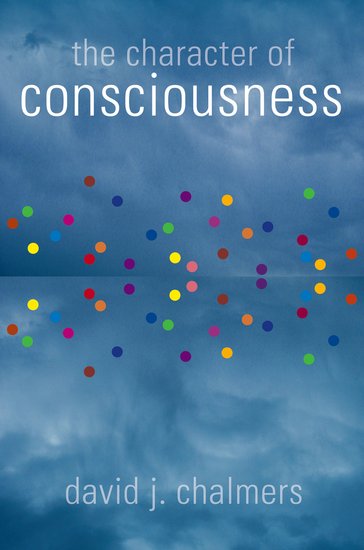the character of consciousness
David J. Chalmers

Publisher’s blurb
What is consciousness? How does the subjective character of consciousness fit into an objective world? How can there be a science of consciousness? In this sequel to the groundbreaking and controversial The Conscious Mind, David Chalmers develops a unified framework that addresses these questions and many others. Starting with a statement of the “hard problem” of consciousness, Chalmers builds a positive framework for the science of consciousness and a nonreductive vision of the metaphysics of consciousness. He replies to many critics of The Conscious Mind, and then develops a positive theory in new directions. The book includes original accounts of how we think and know about consciousness, of the unity of consciousness, and of how consciousness relates to the external world. Along the way, Chalmers develops many provocative ideas: the “consciousness meter”, the Garden of Eden as a model of perceptual experience, and The Matrix as a guide to the deepest philosophical problems about consciousness and the external world.
Table of Contents
Introduction
Acknowledgments
I. The Problems of Consciousness
1. Facing Up to the Problem of Consciousness
Afterword: From “Moving Forward on the Problem of Consciousness”
II. The Science of Consciousness
2. How Can We Construct a Science of Consciousness?
Afterword: First-Person Data and First-Person Science
3. What is a Neural Correlate of Consciousness?
4. On the Search for the Neural Correlate of Consciousness
III. The Metaphysics of Consciousness
5. Consciousness and its Place in Nature
6. The Two-Dimensional Argument Against Materialism
Afterword: Other Anti-Materialist Arguments
7. Conceptual Analysis and Reductive Explanation (with Frank Jackson)
IV. Concepts of Consciousness
8. The Content of Phenomenal Concepts
9. The Epistemology of Phenomenal Belief
10. Phenomenal Concepts and the Explanatory Gap
V. The Contents of Consciousness
11. The Representational Character of Experience
Afterword: The Two-Dimensional Contents of Perception
12. Perception and the Fall From Eden
13. The Matrix as Metaphysics
Afterword: Philosophical Notes
VI. The Unity of Consciousness
14. What is the Unity of Consciousness (with Tim Bayne)
Appendix: Two-Dimensional Semantics